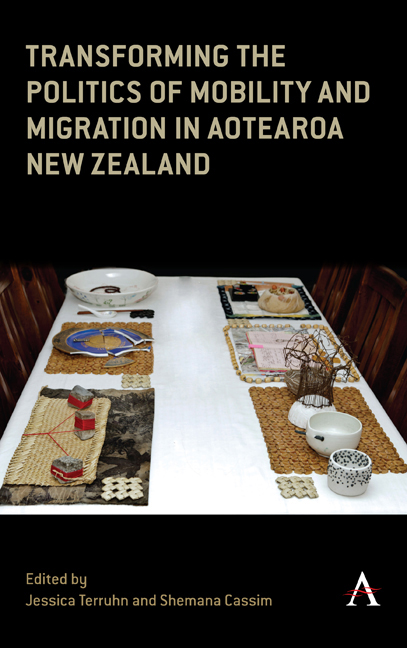Book contents
- Frontmatter
- Contents
- Acknowledgements
- Contributors
- Glossary of Te Reo Māori Words
- Glossary of Te Reo Māori Place Names
- Glossary of Other Non-English Words
- List of Tables
- List of Figures
- Introduction: Reimagining the Politics of Mobility and Migration Through Decolonisation, Social Justice and Solidarities
- Cover Artwork: A Place at the Kauri Table Revisited … 2021
- Part One Decolonising the Politics of Migration
- Part Two Humanising the Politics of Transnational Mobility
- Part Three Building Solidarities for Migrant Rights and Belonging
- Conclusion: Towards Transforming the Politics of Mobility and Migration in Aotearoa New Zealand
- Index
Three - Desirability and Human Capital Privilege in the Politics of Migration in Aotearoa
Published online by Cambridge University Press: 28 February 2024
- Frontmatter
- Contents
- Acknowledgements
- Contributors
- Glossary of Te Reo Māori Words
- Glossary of Te Reo Māori Place Names
- Glossary of Other Non-English Words
- List of Tables
- List of Figures
- Introduction: Reimagining the Politics of Mobility and Migration Through Decolonisation, Social Justice and Solidarities
- Cover Artwork: A Place at the Kauri Table Revisited … 2021
- Part One Decolonising the Politics of Migration
- Part Two Humanising the Politics of Transnational Mobility
- Part Three Building Solidarities for Migrant Rights and Belonging
- Conclusion: Towards Transforming the Politics of Mobility and Migration in Aotearoa New Zealand
- Index
Summary
Introduction
In May 2021, one year into – and in large measure prompted by – the Covid-19 pandemic, the New Zealand Government announced a ‘once-in-a-generation reset’ of the country's immigration system (Radio New Zealand 2021). Since then, the New Zealand Productivity Commission (NZPC), which was tasked with establishing how to ‘make immigration fit for the future’, has articulated recommendations for reform (New Zealand Productivity Commission 2021; 2022), and the Labour Government has recently introduced new migration policies. Overall, recommendations and policy changes so far have aimed to ‘rebalance’ migration by reducing the high levels of largely low-skilled temporary migration that characterised the decade leading up to the Covid-19 pandemic and by simultaneously prioritising highly skilled and highly paid migrants for work visas and pathways to residence. While these developments are rapid, and ongoing, in brief, key elements of this shift so far are the newly introduced Accredited Employer Work Visa (AEWV) which includes salary thresholds that determine both eligibility for attaining the visa and rights regarding length of residence, as well as the Green List which offers fast-tracked residence for migrants in occupations that are highly sought after in Aotearoa. Michael Wood, the current Minister for Immigration, said of the policy change: ‘It marked a shift away from a low-cost labour model that had predominated over the last 15 years, to be more focused on needed skills, sustainable workforces and fair treatment of migrant workers’ (Palmer and McCulloch 2022).
Challenging this perception of fairness, this chapter argues that many of the discourses that inform the NZPC's recommendations as well as the policies introduced so far will effectively further entrench the inequities that have been created by a long-standing and increasingly economistic approach to migration. This approach has pro-gressively encouraged ‘permanent temporariness’, especially of workers categorised as low skilled and low income to fill labour market gaps while curtailing their residence rights (Collins 2019). Pathways to residence have become obstructed with selection criteria that require prospective residents to meet a range of qualifications, skills, wealth and/or, increasingly, income requirements. As a result, the security that permanent residence and naturalisation entail are only accessible to those migrants who are deemed ‘valuable’ settlers.
- Type
- Chapter
- Information
- Publisher: Anthem PressPrint publication year: 2023



